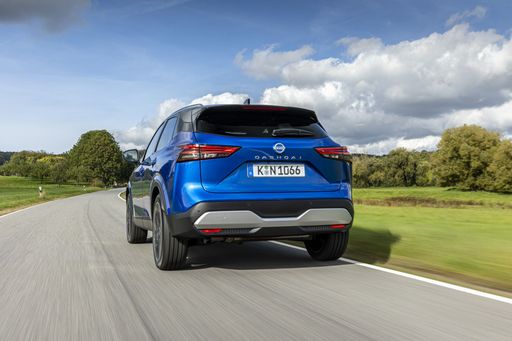Hyundai i20 vs Nissan Qashqai - Differences and prices compared
Compare performance (90 HP vs 205 HP), boot space and price (18600 £ vs 29600 £) at a glance. Find out which car is the better choice for you – Hyundai i20 or Nissan Qashqai?
Costs and Efficiency:
Price and efficiency are key factors when choosing a car – and this is often where the real differences emerge.
Hyundai i20 has a decisively advantage in terms of price – it starts at 18600 £, while the Nissan Qashqai costs 29600 £. That’s a price difference of around 11005 £.
Fuel consumption also shows a difference: Nissan Qashqai manages with 4.50 L and is therefore noticeable more efficient than the Hyundai i20 with 5.70 L. The difference is about 1.20 L per 100 km.
Engine and Performance:
Power, torque and acceleration are the classic benchmarks for car enthusiasts – and here, some clear differences start to show.
When it comes to engine power, the Nissan Qashqai has a significantly edge – offering 205 HP compared to 90 HP. That’s roughly 115 HP more horsepower.
In acceleration from 0 to 100 km/h, the Nissan Qashqai is significantly quicker – completing the sprint in 7.60 s, while the Hyundai i20 takes 11.50 s. That’s about 3.90 s faster.
There’s also a difference in torque: Nissan Qashqai pulls clearly stronger with 330 Nm compared to 172 Nm. That’s about 158 Nm difference.
Space and Everyday Use:
Whether family car or daily driver – which one offers more room, flexibility and comfort?
Both vehicles offer seating for 5 people.
In curb weight, Hyundai i20 is clearly perceptible lighter – 1145 kg compared to 1420 kg. The difference is around 275 kg.
In terms of boot space, the Nissan Qashqai offers noticeable more room – 504 L compared to 352 L. That’s a difference of about 152 L.
When it comes to payload, Nissan Qashqai slightly takes the win – 520 kg compared to 465 kg. That’s a difference of about 55 kg.
Who comes out on top?
Overall, the Nissan Qashqai shows itself to be leaves the rival little chance and secures the title of DriveDuel Champion.
It convinces with the more balanced overall package and proves to be the more versatile choice for everyday use.

Nissan Qashqai
Costs and Consumption
View detailed analysis
Engine and Performance
View detailed analysis
Dimensions and Body
View detailed analysis
Hyundai i20
The Hyundai i20 is a cheeky small car that mixes smart styling with sensible practicality, feeling more polished and roomy than you might expect for the money. It’s an easy car to live with, offering engaging handling, a comfy cabin and useful equipment that make daily commutes and weekend errands notably less dull.
details




Nissan Qashqai
The Nissan Qashqai blends practical, family-friendly packaging with SUV styling that refuses to shout, making it a sensible and dependable choice for everyday life. It’s comfortable to live with, economical on the road, and neatly equipped enough to feel modern without ever feeling precious — perfect if you want crossover versatility without the drama.
details





|

|
|
|
|
Costs and Consumption |
|
|---|---|
|
Price
18600 - 24000 £
|
Price
29600 - 39900 £
|
|
Consumption L/100km
5.70 L
|
Consumption L/100km
4.5 - 6.8 L
|
|
Consumption kWh/100km
-
|
Consumption kWh/100km
-
|
|
Electric Range
-
|
Electric Range
-
|
|
Battery Capacity
-
|
Battery Capacity
-
|
|
co2
128 - 129 g/km
|
co2
102 - 154 g/km
|
|
Fuel tank capacity
-
|
Fuel tank capacity
55 L
|
Dimensions and Body |
|
|---|---|
|
Body Type
Hatchback
|
Body Type
SUV
|
|
Seats
5
|
Seats
5
|
|
Doors
-
|
Doors
5
|
|
Curb weight
1145 - 1170 kg
|
Curb weight
1420 - 1665 kg
|
|
Trunk capacity
352 L
|
Trunk capacity
479 - 504 L
|
|
Length
-
|
Length
4425 mm
|
|
Width
1775 mm
|
Width
1835 mm
|
|
Height
-
|
Height
1625 mm
|
|
Max trunk capacity
-
|
Max trunk capacity
1422 - 1447 L
|
|
Payload
455 - 465 kg
|
Payload
466 - 520 kg
|
Engine and Performance |
|
|---|---|
|
Engine Type
Petrol
|
Engine Type
Petrol MHEV, Full Hybrid
|
|
Transmission
Manuel, Automatic
|
Transmission
Manuel, Automatic
|
|
Transmission Detail
Manual Gearbox, Dual-Clutch Automatic
|
Transmission Detail
Manual Gearbox, CVT, Reduction Gearbox
|
|
Drive Type
Front-Wheel Drive
|
Drive Type
Front-Wheel Drive, All-Wheel Drive
|
|
Power HP
90 HP
|
Power HP
140 - 205 HP
|
|
Acceleration 0-100km/h
11.5 - 12.8 s
|
Acceleration 0-100km/h
7.6 - 10.2 s
|
|
Max Speed
-
|
Max Speed
170 - 206 km/h
|
|
Torque
172 Nm
|
Torque
240 - 330 Nm
|
|
Number of Cylinders
3
|
Number of Cylinders
3 - 4
|
|
Power kW
66 kW
|
Power kW
103 - 151 kW
|
|
Engine capacity
998 cm3
|
Engine capacity
1332 - 1498 cm3
|
General |
|
|---|---|
|
Model Year
2025
|
Model Year
2025
|
|
CO2 Efficiency Class
D
|
CO2 Efficiency Class
E, C
|
|
Brand
Hyundai
|
Brand
Nissan
|
What drivetrain options does the Hyundai i20 have?
The Hyundai i20 is offered with Front-Wheel Drive.
The prices and data displayed are estimates based on German list prices and may vary by country. This information is not legally binding.
